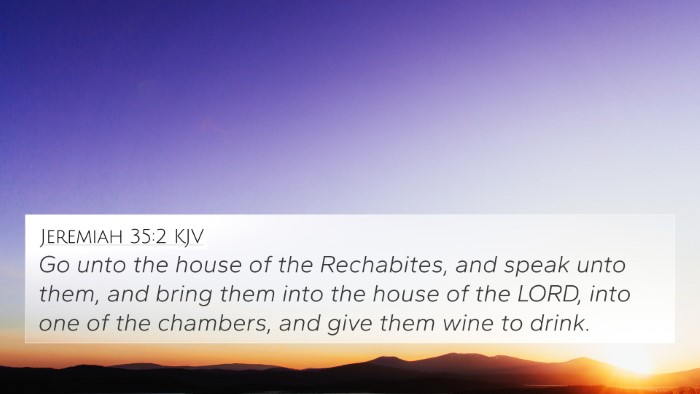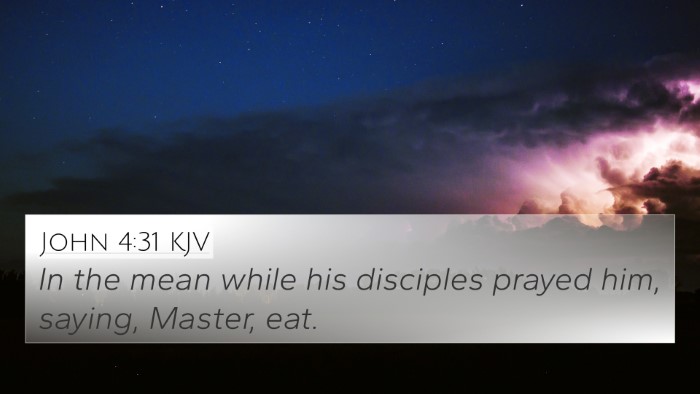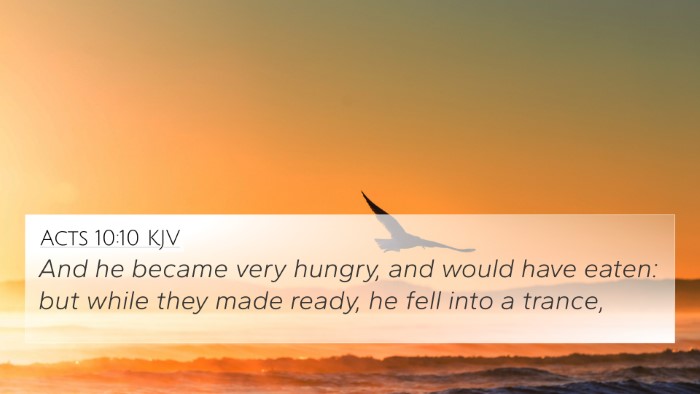Understanding Acts 10:13
Bible Verse: Acts 10:13 - "And there came a voice to him, Rise, Peter; kill, and eat."
This verse is a pivotal moment in the book of Acts, showcasing a divine revelation that alters Peter's understanding of dietary laws and includes Gentiles in God's covenantal promises. The phrase "Rise, Peter; kill, and eat" carries profound theological implications regarding clean and unclean animals and the inclusion of all nations in the Gospel. Below, we synthesize insights from esteemed public domain commentaries to provide a comprehensive understanding of this verse.
Meaning and Insights
Acts 10:13 unfolds during a vision experienced by Peter while praying. The command to "rise, kill, and eat" introduces a theme of divine acceptance and expansion of the mission to include the Gentiles.
Theological Implications
- Peter's Vision: Matthew Henry emphasizes that this vision symbolizes the abolishment of the ceremonial laws regarding dietary restrictions, reflective of God’s grace which transcends the Jewish law.
- Inclusivity of Salvation: Albert Barnes notes that this moment marks a significant shift in understanding God's plan, indicating that the Gospel is for all, not merely for the Jews. This theme of inclusivity resonates throughout the New Testament.
- Cleansing and Acceptance: Adam Clarke explains that the voice emphasizes the idea that what God has cleansed should not be deemed common or unclean. This is a critical pivot in God’s relationship with humanity.
Bible Cross-References
This verse connects with various other scriptures that support its context and theological implications:
- Leviticus 11:1-47: Details the dietary laws, highlighting what is clean and unclean in the Old Covenant.
- Acts 10:28: Peter speaks about God showing him that he should not call any man common or unclean, linking directly to the vision's meaning.
- Galatians 3:28: "There is neither Jew nor Greek... for you are all one in Christ Jesus," reaffirming the inclusivity theme.
- Mark 7:18-19: Jesus speaks about the food being cleansed and indicates that what goes into a man doesn’t defile him, aligning with Peter’s revelations.
- John 10:16: "And other sheep I have, which are not of this fold," suggesting God’s plan encompasses all nations and peoples.
- Romans 10:12: "For there is no distinction between Jew and Greek," further cementing the message that the Gospel is universal.
- Revelation 5:9: "For you were slain, and by your blood you ransomed people for God from every tribe and language and people and nation," connecting to the ultimate vision of the Church.
Interpretative Commentary
The act of "rising" signifies a readiness for action, illustrating Peter's transition from tradition-bound practices to embracing God's redefining mission. The voice commands Peter to challenge his preconceived notions and engage with those he previously viewed as unclean. This moment prepares Peter for his encounter with Cornelius, a Gentile, which leads to the initial steps toward a more inclusive Church.
Cross-Referencing Biblical Texts
Understanding Acts 10:13 requires recognizing its links to both the Old and New Testaments. This chosen verse serves as a bridge between the old covenant restrictions and new covenant freedoms rooted in Christ's sacrifice.
Connections Between Bible Verses
To cultivate a deeper understanding of Acts 10:13, one can utilize various tools for cross-referencing, such as:
- Bible Concordance: A tool to find specific words and phrases across the Bible.
- Bible Cross-Reference Guide: Resources that list verses that relate to similar themes and ideas.
- Comprehensive Bible Cross-Reference Materials: Offering extensive connections for deeper study.
Applying Cross-Referencing Bible Study Methods
For believers seeking to unlock the meanings within this verse, cross-referencing methodologies become invaluable. Here’s a brief overview:
- Utilize a Bible reference resource to identify related passages.
- Engage in a comparative study of Pauline epistles that highlight themes of grace and acceptance.
- Explore cross-references for sermon preparation to illustrate the universal message of salvation.
- Identify cross-referenced themes in the Bible that reinforce God's plan for all humanity.
Thematic Bible Verse Connections
This verse's succinct command encapsulates thematic elements such as:
- Divine Revelation: The Holy Spirit guiding followers to a deeper understanding.
- Faith Challenge: Being called to step outside comfort zones and traditional beliefs.
- Global Mission: The call of the Church to spread the Gospel universally.
Conclusion
Acts 10:13 is not merely a historical account but a transformative moment that reshaped the future of the Christian faith. By analyzing this verse through various lenses and connecting it with other Scriptures, believers gain insight into the expansive nature of God's grace. The inclusion of Gentiles signifies a love that transcends cultural and ceremonial boundaries. As we delve into the interconnectedness of Scripture, we see the overarching narrative of God’s redemptive plan for humanity come to life.





